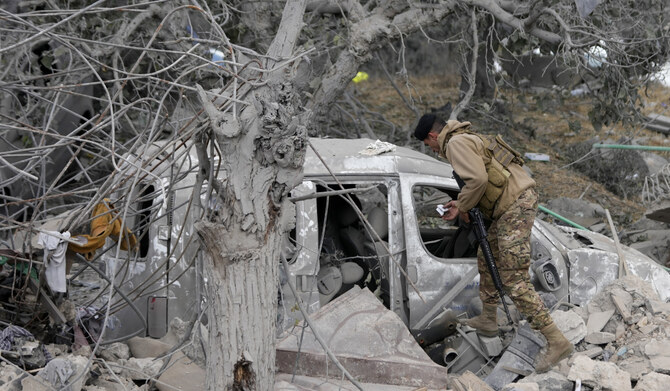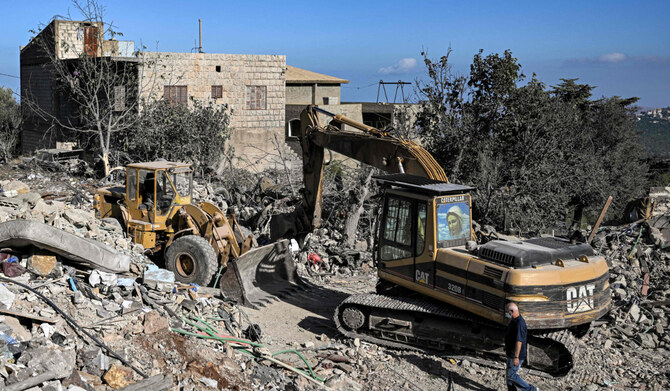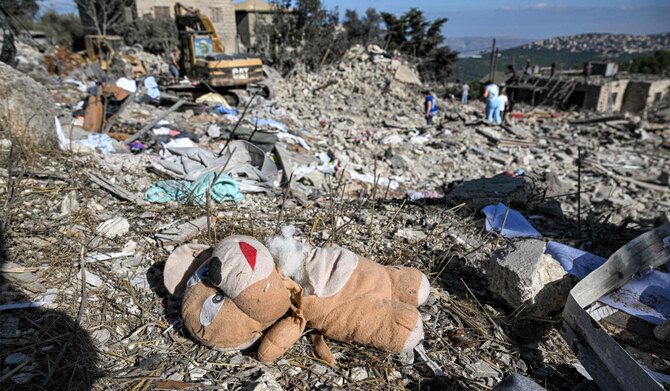AITO: Elie Alwan sheltered a displaced Shiite family from southern Lebanon in his peaceful Christian-majority village, believing they would be safe — instead an Israeli air strike killed them, destroyed his home and injured his mother.
The October 14 strike on the north Lebanon village of Aito in the Zgharta district killed 23 people, including at least 12 women and two children, many of them displaced from south Lebanon, according to the official National News Agency.
“It’s a massacre that happened in my home,” said 42-year-old Alwan.
The attack, which wiped out an entire family, was the first time the mountain village has been struck by Israel, which has mostly targeted Shiite-dominated Hezbollah strongholds.
The four-story building where Alwan lived was destroyed and the displaced family whom he had known for 15 years were wiped out.
“They were a decent family,” said the father of four, blood stains still visible on the rubble-strewn ground beside him.
“I welcomed them as friends.”
Michel Moawad, an MP opposed to Hezbollah and a native of the region, said the strike targeted a member of the pro-Iranian militant group.
A security official, speaking anonymously to AFP, said the strike occurred just after a man arrived by car at the building to visit the displaced family.
“I blame the man who came here. Why did you put us in this mess?” said Alwan, who is now forced to rent a house in the coastal town of Chekka, several kilometers (miles) away.
He was not there during the strike, but his mother was wounded in the leg and was being treated in hospital.
As excavators worked to clear the mountain road a day after the strike, the stench of corpses hung in the air and human remains lay in a ditch at the side of the road.
A statue of Saint Charbel Makhlouf, a Christian Maronite was intact but surrounded by destruction.
The strike sparked alarm across Lebanon’s north and prompted a call for an independent and thorough investigation from the UN rights office.
“We have real concerns with respect to... the laws of war and the principles of distinction, proportion and proportionality,” spokesman Jeremy Laurence told reporters on Monday.
A year of cross-border clashes between Israel and Hezbollah escalated on September 23 when Israel dramatically increased its bombing of Hezbollah strongholds in the country’s east, south and Beirut’s southern suburbs.
The bombing sent many people fleeing to Lebanon’s mountains, including Christian villages which are coming to fear the cost of hosting displaced communities.
“We are Christians, our religion teaches us tolerance. But now we have learned our lesson. We will no longer welcome anyone into the family” home, said Alwan’s brother Sarkis, who lives just next door.
Sarkis did not name Hezbollah but suggested he was angry with the powerful Iran-backed group for dragging Lebanon into a war with Israel.
“We are no match for the United States,” Israel’s main ally, said Sarkis.
Nearby, Adele Khoury was unequivocal in her condemnation of the militant group.
“Hezbollah has brought us into a war from which we can no longer escape,” she said.
Standing beside the church square, the elderly woman said she feared Israel’s string of assassinations of Hezbollah officials would leave no community unharmed.
“We are afraid every day that Israel will come and target us, because wherever there is a (Hezbollah) commander, they target him,” she said.
But when talking about the displaced, she was more sympathetic.
“The poor things, they fled to safe areas, but now nowhere is safe.”


































